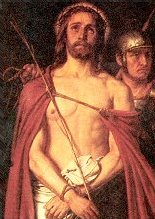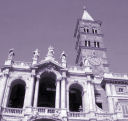Lent: April 17th
Wednesday of Holy Week
» Enjoy our Liturgical Seasons series of e-books!
Old Calendar: Wednesday of Holy Week
Wednesday is known as Spy Wednesday because on this day Judas made a bargain with the high priest to betray Jesus for 30 silver pieces (Matt 26:14-16; Mark 14:10-11; Luke 22:1-6). In Poland, the young people throw an effigy of Judas from the top of a church steeple. Then it is dragged through the village amidst hurling sticks and stones. What remains of the effigy is drowned in a nearby stream or pond.
This is also the day that Jesus was anointed with an expensive jar of alabaster by the woman at Bethany, in the house of Simon the leper (Matt 26:6-13; Mark 14:3-9; John 12:1-19).
The Sacrament of Penance and the Easter Duty
One of the duties of a Catholic is to fulfill the six Precepts of the Church, the positive laws which are "meant to guarantee to the faithful the indispensable minimum in the spirit of prayer and moral effort, in the growth in love of God and neighbor" (Catechism of the Catholic Church, 2041). Two of these precepts directly relate to the upcoming Easter season. The third precept is "You shall humbly receive your Creator in Holy Communion at least during the Easter season." This is tied in with the second precept to "confess your sins at least once a year." If we want to receive Jesus worthily in Holy Communion during Easter, we need to cleanse our souls, especially of any mortal sin through the Sacrament of Penance. Most parishes offer extra confession times for Holy Week, but usually any priest is available on request to hear confession by appointment.
Meditation We are healed by His bruises! O heavenly Physician, who takes upon Himself the sufferings of those He comes to cure! But not only was He bruised for our sins, He was also slaughtered as a lamb; and this not merely as a Victim submitting to the inflexible will of His Father who hath laid upon Him the iniquity of us all, but (as the prophet here assures us) because it was His own will. His love for us, as well as His submission to His Father, led Him to the great Sacrifice. Observe, too, how He refuses to defend Himself before Pilate, who could so easily deliver Him from His enemies: He shall be dumb as a lamb before his shearers, and He shall not open His mouth. Let us love and adore this divine silence, which works our salvation. Let us not pass over an iota of the devotedness which Jesus shows us—a devotedness which never could have existed save in the heart of a God. Oh! how much He has loved us, His children, the purchase of His Blood, His seed, as the prophet here calls us. O holy Church! thou long-lived seed of Jesus, who laid down His life, thou art dear to Him, for He bought thee at a great price. Faithful souls! give Him love for love. Sinners! be converted to this your Savior; His Blood will restore you to life, for if we have all gone astray like sheep, remember what is added: The Lord hath laid upon Him the iniquity of us all. There is no sinner, however great may be his crimes, there is no heretic, or infidel, who has not his share in this precious Blood, whose infinite merit is such, that it could redeem a million worlds more guilty even than our own. — The Liturgical Year, Abbot Gueranger O.S.B.
We are healed by His bruises! O heavenly Physician, who takes upon Himself the sufferings of those He comes to cure! But not only was He bruised for our sins, He was also slaughtered as a lamb; and this not merely as a Victim submitting to the inflexible will of His Father who hath laid upon Him the iniquity of us all, but (as the prophet here assures us) because it was His own will. His love for us, as well as His submission to His Father, led Him to the great Sacrifice. Observe, too, how He refuses to defend Himself before Pilate, who could so easily deliver Him from His enemies: He shall be dumb as a lamb before his shearers, and He shall not open His mouth. Let us love and adore this divine silence, which works our salvation. Let us not pass over an iota of the devotedness which Jesus shows us—a devotedness which never could have existed save in the heart of a God. Oh! how much He has loved us, His children, the purchase of His Blood, His seed, as the prophet here calls us. O holy Church! thou long-lived seed of Jesus, who laid down His life, thou art dear to Him, for He bought thee at a great price. Faithful souls! give Him love for love. Sinners! be converted to this your Savior; His Blood will restore you to life, for if we have all gone astray like sheep, remember what is added: The Lord hath laid upon Him the iniquity of us all. There is no sinner, however great may be his crimes, there is no heretic, or infidel, who has not his share in this precious Blood, whose infinite merit is such, that it could redeem a million worlds more guilty even than our own. — The Liturgical Year, Abbot Gueranger O.S.B.
 Wednesday of Holy Week
Wednesday of Holy Week
Station at St. Mary Major (Santa Maria Maggiore):
The Station today is at St. Mary Major for the second time during Lent. As we set our eyes on the Sacred Triduum, it is good to stand in solidarity with our Mother of Sorrows as we contemplate our Redemption.
